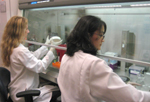Student dives into reef ecosystem research
by Megan Fink
Public Relations
Marine science often translates into discoveries for medical science, and the research being done through a National Science Foundation (NSF) grant is another way MUSC is interfacing with the environmental community to improve human health.
The federal-state collaboration exhibited in projects conducted at the Hollings Marine Laboratory (HML) on James Island has presented MUSC students with extraordinary scientific pursuits. Nikole Kimes, for one, is examining the role microbial communities play in coral health and disease. Kimes, a Marine Biomedicine and Environmental Sciences graduate student, earned a NSF fellowship to study the mechanisms of diseased coral reefs to see what function is disturbed.
 Graduate students
Nikole Kimes, left, and Maria Vizcaino examine coral microorganisms
under the hood at Hollings Marine Laboratory located on James Island.
Kimes takes a small amount of coral DNA and amplifies it using
thermoregulation, while Vizcaino tests for the presence of antibiotic
activity.
Graduate students
Nikole Kimes, left, and Maria Vizcaino examine coral microorganisms
under the hood at Hollings Marine Laboratory located on James Island.
Kimes takes a small amount of coral DNA and amplifies it using
thermoregulation, while Vizcaino tests for the presence of antibiotic
activity. Kimes’ NSF Graduate Research Fellowship is the first of its kind for an MUSC graduate student. It sets precedence for other biomedical researchers to obtain funding from the independent federal agency.
“The NSF Graduate Research Fellowship program is fiercely competitive with less than a 10 percent success rate of attaining an award,” said Joann Sullivan, Ph.D., assistant dean, College of Graduate Studies. “On average, there are only about 900 awards made nationwide, and this covers all disciplines that the NSF supports including biology, social sciences, physical and mathematical sciences, and engineering. Nikole’s award is a first in MUSC history.”
Her work is part of a larger project on Caribbean coral diversity funded by an NSF award to her mentor Pam Morris, Ph.D., research associate professor, Department of Cell Biology and Anatomy and Marine Biomedicine and Environmental Sciences Center. Morris’ research focuses on characterizing microorganisms present in healthy and diseased coral communities, while Kimes wants to know the ecological function of these microorganisms.
“I think it speaks volumes to the research Dr. Morris is doing in that this is a burgeoning field right now; both within coral ecosystems and human ecosystems,” said Kimes. “We’re learning there are even microbial communities in the human gut that regulate metabolism and affect the physiology of stress and disease. So, it’s not just within the marine ecosystems that this research is being sought. What I’m looking at really isn’t tied to just one organism.”
Common Caribbean coral and their associated microorganisms that help cycle energy and nutrients are sensitive to environmental changes. This study targets coral components at the cellular level to determine the impact of ecological transformations. According to Kimes's and Morris’s data, healthy communities of coral use different means to accomplish similar functions than diseased (yellow-band infected) colonies of the coral Montastraea faveolata.
“With coral reef habitats undergoing such extensive degradation, there is a sense of urgency within the research community to study corals and their associated communities” said Morris. “Nikole has designed an excellent research proposal for her doctoral research that should significantly contribute to our understanding of these threatened communities.”
The assessment of microbial diversity and its purpose is just one example of collaborative research conducted at HML. While MUSC is spearheading this project, the proximity of the other four HML partners aid in its progression. Experts from MUSC, the National Oceanic and Atmospheric Admini-stration (NOAA), the College of Charleston, the National Institute of Standards and Technology, and the South Carolina Department of Natural Resources work systematically in thematic labs within the same building. HML researchers and students are breaking institutional barriers through this team approach linking environmental health to human health. For example, the coral microorganisms that Kimes studies are being examined for novel anti-microbials in the Morris Lab by MUSC graduate student Maria Vizcaino and NOAA Natural Products Chemist, Peter Moeller, Ph.D.
“Our research is pertinent to both the marine and medical field,” said Kimes. “It shows that the relationships and collaborations at HML are beneficial.”
Friday, Oct. 3, 2008
Catalyst Online is published weekly,
updated
as needed and improved from time to time by the MUSC Office of Public
Relations
for the faculty, employees and students of the Medical University of
South
Carolina. Catalyst Online editor, Kim Draughn, can be reached at
792-4107
or by email, catalyst@musc.edu. Editorial copy can be submitted to
Catalyst
Online and to The Catalyst in print by fax, 792-6723, or by email to
catalyst@musc.edu. To place an ad in The Catalyst hardcopy, call Island
Publications at 849-1778, ext. 201.